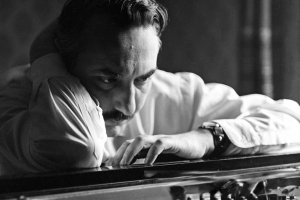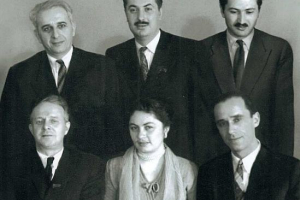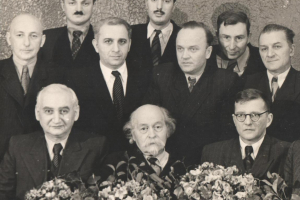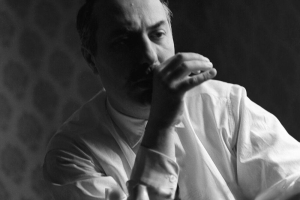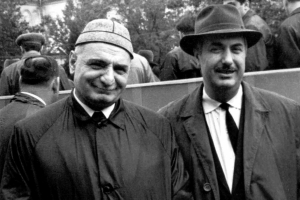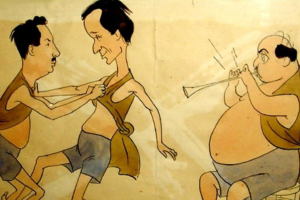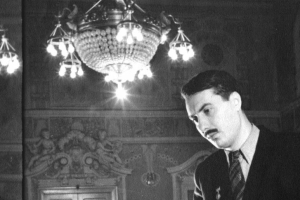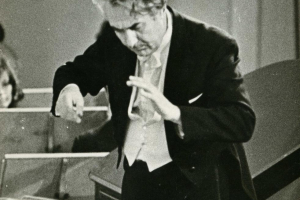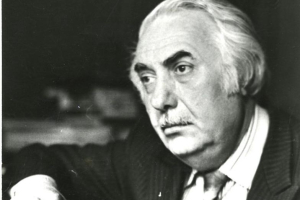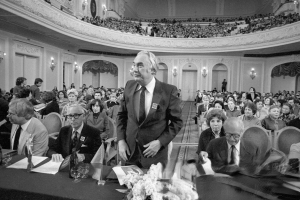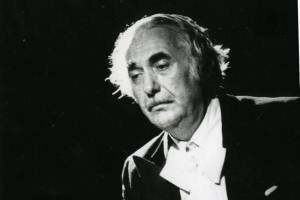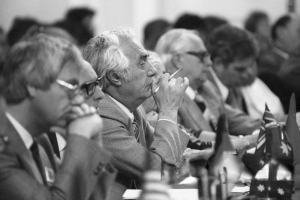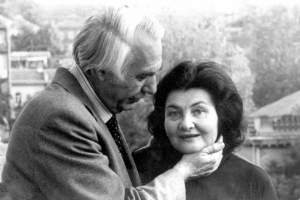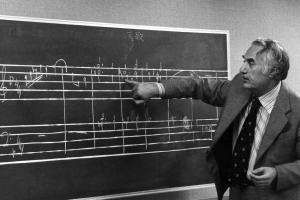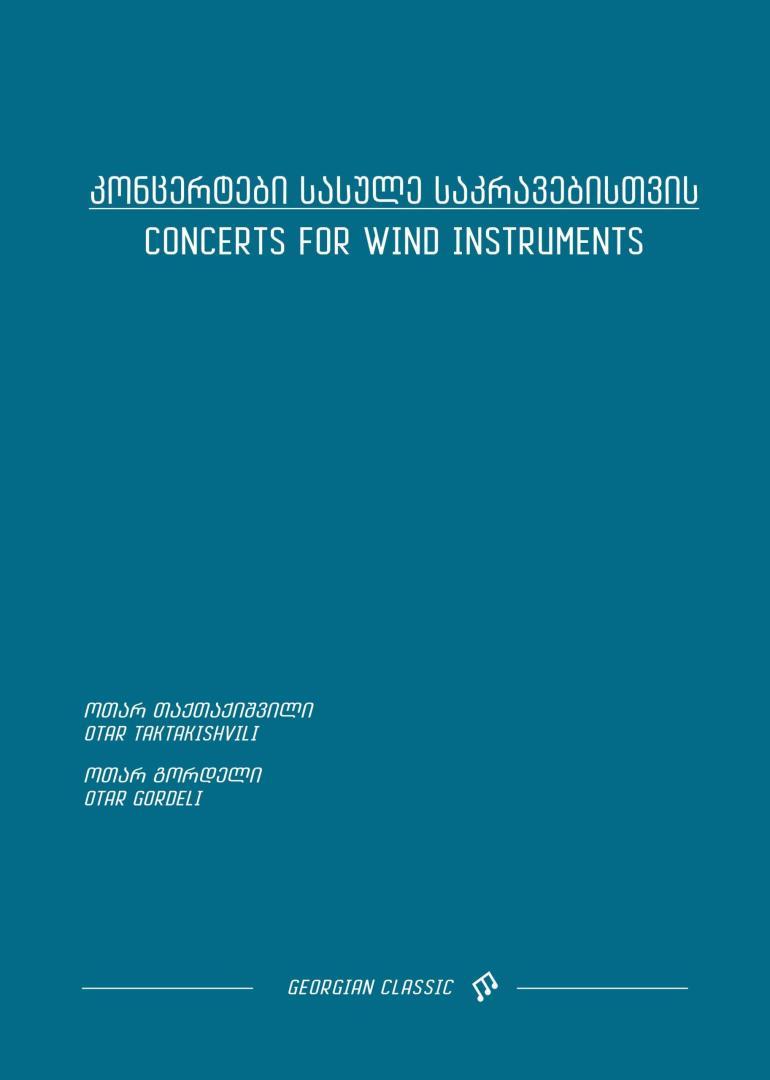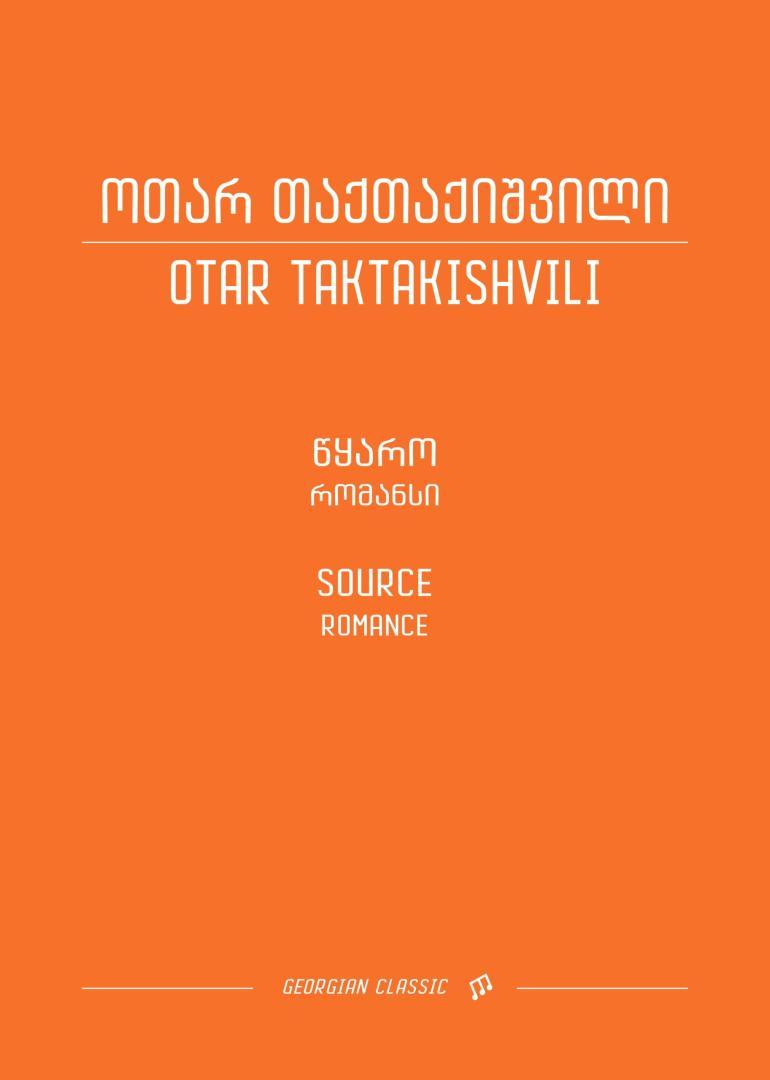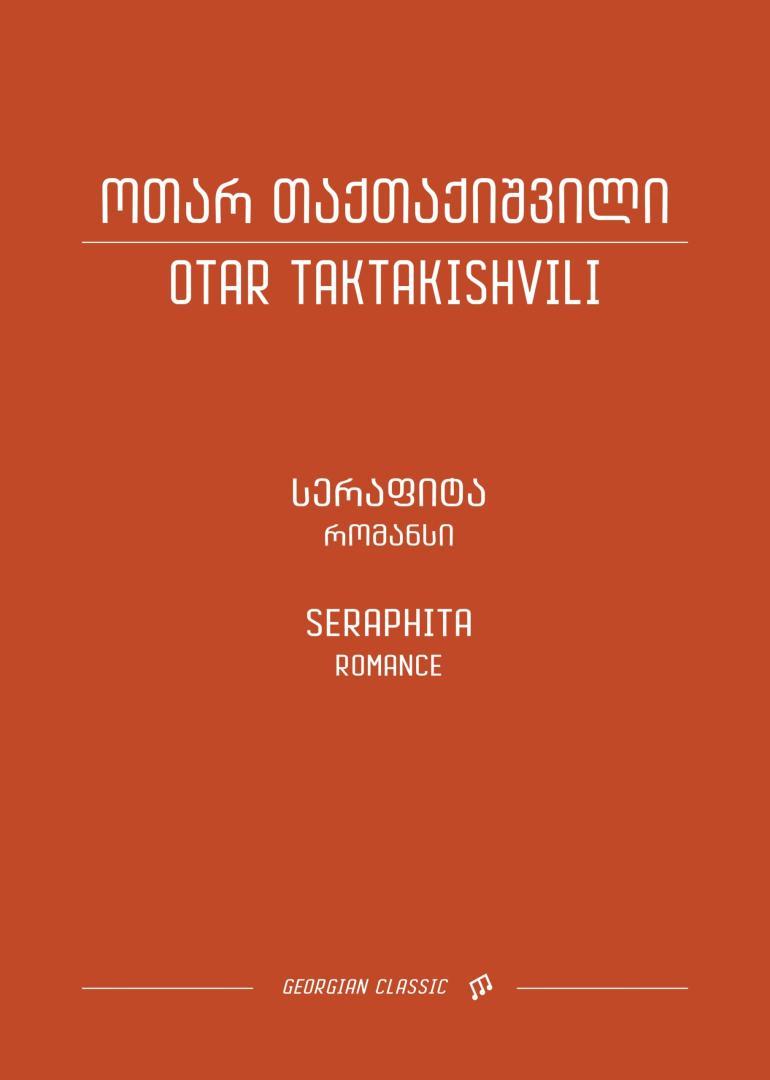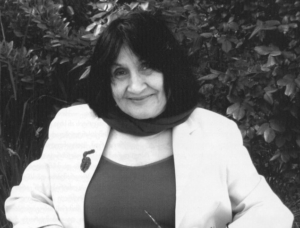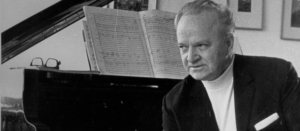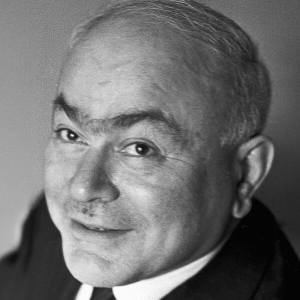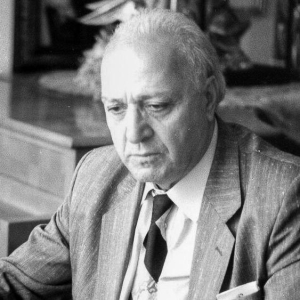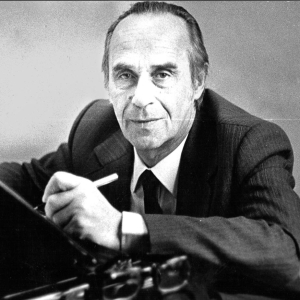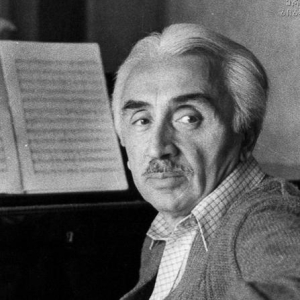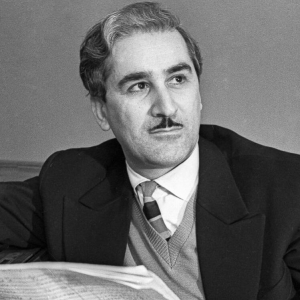Otar
Taktakishvili
Otar Taktakishvili
(1924 – 1989)
Otar Taktakishvili – Georgian Composer, Conductor, Teacher, Public Figure. People’s Artist of Georgia (1961), People’s Artist of the Soviet Union (1974), Leninist (1982), Stalinist (1951, 1952), Shota Rustaveli (1984) and Soviet Union State Prizes (1967). Minister of Culture of Georgia (1965 – 1984). The anthem of the Soviet Republic of Georgia belongs to him, which he wrote while still a student of the Tbilisi Conservatory.
Date of birth – July 27, 1924
Place of birth – Tbilisi, Georgia
Date of death – February 24, 1989
Place of death – Moscow, Russian Federation
He is buried in Didube Pantheon of Writers and Public Figures – Tbilisi
BIOGRAPHICAL DATA
1947 – Graduated from the Tbilisi State Conservatory named after Vano Sarajishvili, majoring in composition (class of S. Barkhudariani);
1950 – Graduated from Vano Sarajishvili Tbilisi State Conservatory. under the leadership of Barkhudarian;
1943 – 1945 – Concertmaster of the United Orchestra of Tbilisi Music Schools;
1944 – 1946 – Concertmaster of the choir of the Radio Broadcasting Committee;
1947 – 1952 – Concertmaster and conductor of the Georgian Choir Chapel;
1952 – 1956 – Director and artistic director of the Georgian Choir Chapel;
Since 1951 – Teacher at Vano Sarajishvili Tbilisi State Conservatory (1951), docent (1959), professor (1966)
Since 1952 – he worked as a conductor;
1962 – 1965 – Rector of Tbilisi State Conservatory named after Vano Sarajishvili; 1965 – 1984 – Minister of Culture of Georgia;
AWARDS AND RECOGNITION
1946 – Member of the Union of Composers of the Soviet Union
Since 1957 – Member and secretary of the board of the Union of Composers of the Soviet Union
In different years: member of the Lenin Prize Committee, member of the International Music Council of UNESCO, chairman of the Society for the Protection of Monuments of Georgia
1962 – Chairman of the Union of Composers of Georgia
1961 – People’s Artist of Georgia
1974 – People’s Artist of the USSR
1951 – Stalin Prize of the third degree
for the I symphony
1952 – Stalin Prize of the second degree
for concerto for piano and orchestra
1967 – USSR State Prize
for the Oratorio “In The Footsteps Of Rustaveli” (Text By I.V. Abashidze)
1977 – 1982 – Lenin Prize
for the Opera The Kidnapping of the Moon (1977) and Concerto for Violin and Orchestra (1982)
1984 – Shota Rustaveli State Prize of the Georgia (1984)
1966, 1984 – Order of Lenin
1971 – Order of the October Revolution (1971)
1958 – Order of the Red Banner of Labor (1958)
Medals
1985 – Honorary citizen of Tbilisi (1985).
1986 – Albert Schweitzer Award (1986)
Otar Taktakishvili
(1924 – 1989)
SELECTED WORKS
MUSIC FOR THE THEATER
1961 – “Mindia” – Opera in 2 Acts – (libretto – R. Tabukashvili, O. Taktakishvili)
1964 – “Jildo” – (“Award“) – (TV Opera)
1967 – “Three Novels” (the same as “Three Lives”) – a Triptych of One-Act Operas – “Ori Ganacheni”, “Soldier” “Chikori” – (libretto – O. Taktakishvili)
1974 – 1977 – “Abduction of the Moon” – Opera in 3 Acts – (libretto – O. Taktakishvili)
1978 – “Mususi” – Comic Opera in One Act – (libretto – O. Taktakishvili)
1980 – “First Love” – Comic Opera In 2 Acts – (libretto – R. Gabriadze)
1989 – “Marita” – One-Act Opera
ORCHESTRAL MUSIC
1949 – Symphony N 1 “Youth”
1953 – Symphony N 2
1953 – “Symphonic Miniatures” – “Lyric”, “Wrestling”, “Elegy”
1954 – “Light Overture”
1956 – “Small” – Symphonic Poem
1963 – “Humoreska” – for Chamber Orchestra
1974 – “Chamber Symphony”
1980 – Overture of Freedom Fighters
1982 – “Symphonieta” – for Chamber Orchestra
1983 – 3 Pieces for Chamber Orchestra
1950 – Concerto for Piano and Symphonic Orchestra N 1
1973 – Concerto for Piano and Symphonic Orchestra N 2 – “Mountain singers”
1973 – Concerto for Piano and Symphonic Orchestra N 3 – “Akhalgazduli”
1983 – Concerto for Piano and Symphonic Orchestra N 4 – “Mountain singers”
1976 – Concerto for Violin and Symphonic Orchestra N 1
1977 – Concerto for Violin and Symphonic Orchestra N 2
1947 – Concerto for Cello and Symphonic Orchestra N 1
1977 – Concerto for Cello and Symphony Orchestra N 2
1955 – Concerto for Trumpet and Symphonic Orchestra
CHAMBER-INSTRUMENTAL MUSIC
1983 – String Quartet No. 1
1988 – Piano Trio
1987 – Piano Quintet
1985 – Sonata for Flute and Piano
1985 – Sonata for Cello and Piano
1987 – Piano Cycle “Watercolors”
VOCAL-INSTRUMENTAL MUSIC
1963 – “Existing Hearth” – Oratorio – (text – S. Chikovani)
1964 – “In the footsteps of Rustaveli” – Oratorio – (text – I. Abashidze)
1970 – “Nikoloz Baratashvili” – Oratorio – (song by N. Baratashvili)
1954 – “Cantata about Tbilisi” – for Soloists, Chorus and Symphony Orchestra – (text – I. Grishashvili)
1958 – “To the defenders of the Caucasus” – Cantata – (text – S. Chikovani, I. Abashidze, Folk)
1971 – “Guru songs” – Cantata for Male Vocal Octet, Mixed Choir and Symphony Orchestra – (text – folk)
1956 – 5 vocal poems – for Mezzo-Soprano, Soprano and Symphony Orchestra – (text – G. Tabidze)
1959 – “The Way of the Poets” – Vocal-Symphonic Suite – (text – V. Pshavela. I. Chavchavadze, G. Leonidze)
1962 – “Rock and River” – Vocal Symphonic Poem – (text – V. Pshavela)
1972 – “Megrelian Songs” – Suite for Soloist, Male Vocal Octet and Chamber Orchestra – (text – folk)
1973 – “Lyric songs” – Suite for Soprano, Tenor, Male Vocal Octet and Chamber Orchestra – (text – M. Fotshishvili)
1979 – “Secular Hymns” – Suite for Men’s Choir and Soloists – (text – Sh. Rustaveli, Demetrius I, S. Chikovani)
1983 – “Akaki’s Changi” – Suite for Soloists, Choir, Flute, Percussion and Harp – (text – A. Tsereteli)
1983 – “Cartlian songs” – for Women’s Choir – a Cappella – (text – folk)
AUTHOR OF MANY CHORUSES, ROMANCES, SONGS
FILM AND THEATER MUSIC
Music for the theater
the author of more than 40 plays. Among them: “The Winter’s Tale”, “Oedipus the King”, “Boris Godunov”, “Antigone”, “King Lear”, “The Abduction of the Moon”, “Don Carlos”, “Cleopatra”…
FILMOGRAPHY
1957 – “Song of Ether” – director – Simon (Siko) Dolidze
1957 – “I will tell the truth” – director – Levan Khotivari
1982 – “The Law of Eternity – director – Valerian Kvatchadze
1984 – “Monday is an ordinary day – director – Valerian Kvatchadze
Otar Taktakishvili
(1924 – 1989)
One of the ways that Georgian professional music expresses its identity is through Otar Taktakishvili’s works. The composer’s creative biography is considered to be exceptional even in the long term, and the presentation of nearly all of his works has evolved into a noteworthy experience. The author’s charismatic personality in the role of the a performer, often a conductor, elevated the atmosphere generally.
The musical legacy of Otar Taktakishvili is defined by it’s variety of genres. He has written six operas and ballets, two symphonies, four piano concertos, two violin concertos, cantatas, oratorios, chamber-instrumental works, romances, and songs, as well as vocal cycles and vocal-instrumental works.
The composer’s first success was related to two symphonies (1949, 1953) and a piano concerto, (1951). The composer’s first success was related to two symphonies (1949, 1953) and a piano concerto, (1951). The link between the composer and the traditions of Western European and Russian music were clearly explained in the works of the time, while at the same time, unique national characteristics were underlined. The Symphony No. 1 (1949), was a glaring example of these aspects. The piece’s constructive understanding, generalization concept, and balancing of a variety of genres made it a significant point in Georgian professional music.
Another famous piece from the 1950s is Symphony No. 2, in which the composer effectively brought to life aspects of psychological drama, poetry, and choral music that were based on the principal dramaturgical line.
The piano concerto No. 1 by Taktakishvili, which was played by different pianists in several countries, was regarded as a fundamental piece of this genre. Tamar Khuroshvili, a musicologist, says “It follows the direction that the Georgian piano concerto had originally done in its formation. However, we also discover some fascinating results in this work, both in terms of recreating the concert’s form and its ideological substance “.
Davit Oistrakh’s debut performance of the violin concertino (1956) and recording of this piece as well, were broadly accepted. It is important that the composer used and enlarged the concertino’s
tonal content in his later works (romances, opera “Mindia”). The trumpet concerto from 1955 and the “Mtsiri” symphonic poem from 1956 are both from this period of time.
From the 60s of the last century, a new, most important period in Taktakishvili’s creative life begins. The composer brought different aesthetic ideas, but from the viewpoint of musical language, he finds the formative stylistic processes occurring at the moment in Georgian music, unacceptable.
But the other. The composer integrated the new tendences of 20th-century global musical theater and mixed them with the native roots. Vocal, vocal-instrumental, and operatic genres have been at the forefront in Taktakishvili’s artistic vision since this time.
Otar Taktakishvili’s creativity was largely inspired by Georgian folk music and national literature. His compositions in several genres, including operas, oratorios, vocal cycles, and romances, were based on these. Thus, it is essential to emphasize the oratorios “Rustavelis nakvalevze”, (On the Footsteps of Rustaveli”) (1964) and “Nikoloz Baratashvili” (1970), in which the composer presented epochal portraits of two of the greatest Georgian authors, Shota Rustaveli and Nikoloz Baratashvili. Taktakishvili was the first to introduce religious themes into Georgian classical oratory, which he based on national hymns. A philosophically comprehensive approach to phenomena within this genre was also unusual in Georgian professional music. This put the composer’s ability to mix genres, combining aspects of ancient theater, cantata, and vocal cycle, and express a lot of information in a short amount of time into a new category. The above mentioned works, with the given elements, established new directions for the Georgian oratorical genre’s evolution.
The opera compositions of Taktakishvili are influenced by native literature. The pantheistic- philosophical elements from the Vazha-Pshavela world inspired the composer to research more about folklore of Georgia’s mountains (opera “Mindia”, libretto by Revaz Tabukashvili, 1961).
The novels of Mikheil Javakhishvili led him to develop an entirely new opera-dramatical format (“Sami Novela” (Three Novels”), 1967, “Mususi”, 1978). The complex novel “Mtvaris motatseba”(“The Abduction of the Moon”) by Konstantine Gamsakhurdia served as the inspiration for a monumental lyrical-heroic opera with the same name.
The composer was motivated by the mentioned literary source to turn to the folklore of various regions of Western Georgia, including Megruli, Guruli, Abkhazian, and Svanuri. (Opera “Mtvaris Motatseba” (“The Kidnapping of the Moon”), 1977). The compositional style based on this intonation was termed “Kolkhuri Cantilena” by musicologist Anton Tsulukidze.
The evolution of Georgian comedic opera was significantly influenced by Otar Taktakishvili. The comedic introduction frequently emerged in the composer’s instrumental works, symphonies, concerts, and operas, in which it fully appeared – (“Sami novela” (Three novels), “Mussusi”, “Pirveli sikvaruli” (“First Love”). The operas created by Taktakishvili represented the start of a new era in the development of Georgian opera. The presentation of his operas, which cover the 1960s to 1980s of the 20th century, gave Georgian opera a “second wind” after a continuous crisis, – according to musicologist Marina Kavtaradze. The fundamental feature of Taktakishvili’s operas is that the composer successfully balanced all of the opera’s various components, developing into a fascinating composer-playwright, (he also became the author of his own opera libretto many times). It is particularly significant since he introduced six operas to this unique musical genre that differ from one another in terms of theme, genre, and structural elements.
The success of Otar Taktakishvili’s works both in Georgia and abroad is indicative of their ability to endure. Unique musical language unites the composer’s creations, thus allowing to distinguish in any circumstances.
Musicologist
Tamar Tsulukidze
English Language Translator
Tamar Kharadze



